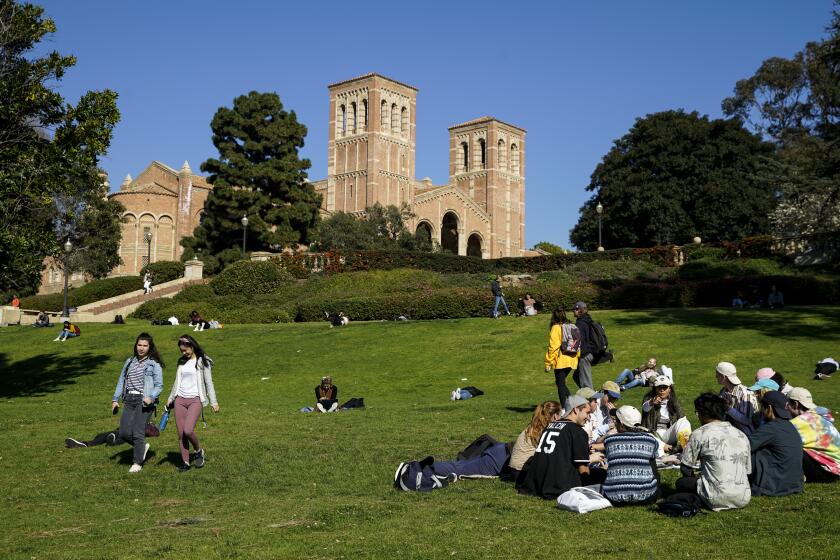As protests roil college campuses, young voters’ support for Biden hangs in the balance

- Share via
After days of protests roiling college campuses, President Biden broke his silence with a terse speech condemning the chaos and calling for order, while also holding up protest as a fundamental American right.
Will Biden’s comments be enough to sate young voters? Some political analysts think not.
“For Biden to get back on track with young voters, he needs to think and act differently and really take to heart what these young activists have been asking for,” said Diane Wong, assistant professor of political science at Rutgers University.
In a five-minute speech at the White House on Thursday, the president tried to balance two fundamental principles: the right to protest and the rule of law.
“Violent protest is not protected. Peaceful protest is,” he said. “Vandalism, trespassing, breaking windows, shutting down campuses, forcing the cancellation of classes and graduation — none of this is a peaceful protest.”
In addition to calling on their universities to divest from companies doing business in Israel, students have called on the administration to withhold military support from Israel. They’ve also urged Biden to push harder for a peaceful solution in the war between Israel and Hamas.
“Mr. President,” a reporter asked, “have the protests forced you to reconsider any of the policies with regard to the region?”
“No,” Biden said, turning from the lectern and leaving the room.
Less than 24 hours after a violent attack on a pro-Palestinian camp at UCLA, officers pulled apart barricades as they tore down the encampment and made arrests.
Biden’s dismissive reaction to students’ concerns about Gaza has already hampered his campaign, Wong said, pointing out that students at Rutgers University, located in New Jersey, campaigned to push Democratic Michiganers to vote “uncommitted” rather than cast a ballot for Biden in Michigan’s primary.
For months, the Biden campaign has been pushing issues seemingly close to young voters’ hearts — forgiving student debt, advocating for abortion access and even reclassifying marijuana as a less dangerous drug. Still, Democratic strategist Carly Cooperman said, the campaign’s messaging is not cutting through to youth voters.
“We’ve seen poll after poll show that Biden is just underwater with this group,” Cooperman said.
Wong said the Biden campaign is banking on wooing young voters with issues other than Gaza.
“To me, that seems risky, and a move that Biden will likely regret come November,” Wong said. “Because yes, Gen Z are not single-issue voters, but they’ve collectively just experienced some of the worst political repression on college campuses that we’ve seen in decades. And trauma from this kind of violence is remembered.”
People across Gaza sent thanks to students protesting on U.S. campuses against Israel; Israeli leaders characterized the demonstrators as ‘pro-Palestinian mobs.’
Until this week, Biden had left it to other administration officials to speak out about the college protests. Former President Trump also has said relatively little, though on Wednesday he praised police for cracking down on protests at Columbia University, calling the students “raging lunatics” and “Hamas sympathizers.”
He mused about whether the students who vandalized campus buildings would be prosecuted in the same way as his supporters who ransacked the Capitol on Jan. 6, 2021.
Young voters famously don’t vote at the same rates as older adults and retirees. Still, their turnout has inched up in recent years. The 2022 midterms saw the second-highest percentage of voters ages 18-29 casting their ballots in a midterm in decades, said Mindy Romero, director of the Center for Inclusive Democracy at USC’s Price School.
A poll by Harvard’s Institute of Politics, released last month, found that more than half of Americans between 18 and 29 say they will vote in November — which is on par with its 2020 findings.
“Young people today have clear concerns about where our country is headed,” Setti Warren, director of the institute, said in a statement. “From worries about the economy, foreign policy, immigration, and climate, young people across the country are paying attention and are increasingly prepared to make their voices heard at the ballot box this November.”
Biden still leads among young voters, but there’s now a big gap between young men and young women, a Harvard polls found.
One of the foremost issues young voters agree on is support for a cease-fire between Israel and Hamas. Slightly more than half of 18- to 29-year-olds support a cease-fire while 10% oppose, the Youth Poll found.
Biden’s situation with young voters over his handling of the Israel-Hamas conflict has become even more pronounced after a week of protests on college campuses. College-educated youth voters are both Biden’s most likely supporters and those most closely following news about the conflict.
The Harvard poll found that youth voters with a college degree are 50% more likely to pay attention to the news about Israel-Hamas, compared with 39% of current college students and 32% of those who never attended college.
Those voters without degrees present a particular challenge to Biden.
“There’s a lot of voters who don’t have college degrees,” Cooperman said. “And these younger people are really struggling with day-to-day cost of living and the impact of inflation. For them, they’re generally discouraged and unhappy with the status quo. And their current president is Biden. So there is an aspect of this that becomes a referendum on him.”
Trump’s support among young voters generally pales in comparison with his rival‘s — Biden leads by 19% among likely voters under 30, according to the Harvard poll. But, the poll notes, “The race is even among those not in college and without a four-year degree.”
For college students, the war in Gaza is creating unusual momentum for political engagement, Romero said. Typically, she said, political issues in the news do not translate to droves of young voters going to the polls. But the Middle East war is different.
“The topic itself lends it, because of how big it’s intertwined with the Biden administration and their policies,” Romero said. “And it’s an election year, where they feel they have some power. There’s some consequence. They can hold the administration accountable.”
Campaigns would be smart to capitalize on the youth engagement by offering a listening tour, she added.
“Just from an engagement, democratic process perspective, this is an opportunity for the president for both parties to talk to young people about what they care about and campaign around their positions,” Romero said. “This is of course an incredibly difficult issue to navigate.”
While the president has been reluctant to address young voters directly on the issue, Rep. Ro Khanna (D-Fremont) is one of the Biden campaign’s go-to surrogates grappling with Gaza.
RFK Jr., who recently qualified for the California ballot as a member of the American Independent Party, could draw votes from Biden and Trump.
Though Khanna supports the president, he has has been outspoken about his belief that the U.S. should refrain from sending more military aid to Israel, and has been open about his disagreements with Biden on the issue.
In a recent visit to the University of Wisconsin in Madison, Khanna asked a roomful of Jewish and Muslim students about their views on Biden, according to a video he posted to X on Wednesday.
“The generation in Washington, regardless of party, has been unable to solve it,” Khanna said of the Middle East conflict. “And my hope is more with your generation.”
The school year will soon end, and there’s no telling where pro-Palestinian encampments on campuses — or young voters’ support for Biden — will go.
More to Read
Get the L.A. Times Politics newsletter
Deeply reported insights into legislation, politics and policy from Sacramento, Washington and beyond. In your inbox three times per week.
You may occasionally receive promotional content from the Los Angeles Times.













